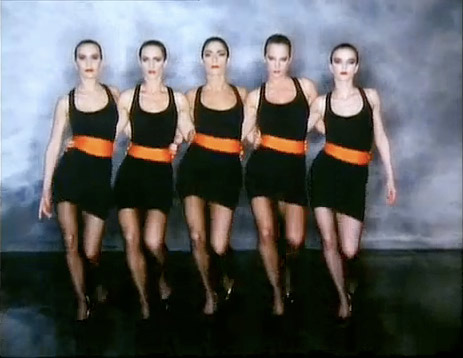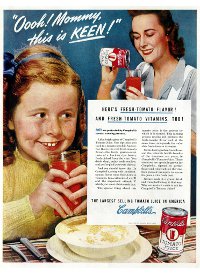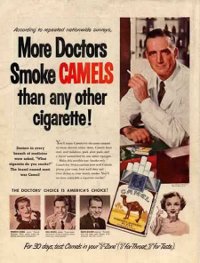
It’s almost impossible to imagine that someone could use Bret Easton Ellis’ American Psycho as source material for a play and both do the original theme justice while simultaneously create something completely new that doesn’t just ape the original. And yet Ashley Jacobson’s The American Play does just that – not only gives a nod to American Psycho but goes one further and deepens the richness of the original, heightens the irony, darkens the humor and updates the flavor to address the passing of the last 20 years. The American Play pays homage in a way that both manages to celebrate the original work and — quite frankly — leaves it in the dust.
To say that I’m a fan of the book (and subsequent movie) American Psycho is a stretch – rather, I was a student of it … but nowhere near as dedicated as the two main characters of The American Play – Luis (Shane Jensen) and Tim (Jimmy Dailey) who meet at a critical time in both their lives. In terms of trappings, Luis is an updated Patrick Bateman – a well dressed, caustic observer of his surroundings who makes brilliant deductions about his fellow travellers and reduces everyone to a cog in the constantly churning wheel. Tim, however, has the soul of Bateman, which is a far scarier prospect.
Director Alexandra Siladi’s dark and moody staging deepens the jaded view of the men’s microcosm: seeing the world through their eyes the stage is barely illuminated, the nondescript crowd is made up of seductively black-clad women who remain anonymous and interchangeable behind their ominous cellophane masks. These women rarely speak, they often move in unison and can be reminiscent (somewhat ironically – perhaps somewhat intentionally) of the Robert Palmer girls. They are as blank, as choreographed and as “Simply Irresistible” – though of course the ironic twist is that even the most luscious among them are dismissed as too stupid, “a five” or “the fat friend”. In the one small moment when the crowd of women actually speak they do so in soundbites, and harshly … and as men. It is a brilliant, if bitter, moment.
And this is where both Jacobson’s script and Alexandra Siladi’s direction shine: Ellis gave the world an American Psycho whose brutality was graphic and gruesome and indifferent, but Jacobson and Siladi give audiences a team in Luis and Tim who, 20 years later, have digested the once-terrifying images like so much top-shelf liquor and waves it away with an impatient dismissive flourish. Weaned on the very pablum that Bateman was spewing both men idolize the text, digest the contents, and in turn serve it up in far more palatable, poisonous bites.
While Luis has the outward trappings of the perfect American psycho, it is the elusive Tim who is hiding his trailer-park upbringing and a history of peer abuse; Tim who actually cloaks a perfectly cloned inner-Bateman underneath his mismatched clothing, awkward social interaction and public misfires. When the two meet it is like two halves of a sacred coin coming together with a crack of lightening.
TIM: [ ...] everyone has a uniform. It’s fucking New York. Everyone has a part they’re playing. Ellis was just honest about it – he said this is what it’s like for yuppies, but you can apply it to everyone.
LUIS: Everyone. Even this little pill with the Tom’s shoes, Those Red-for-Aids T-shirts, Starbucks cups and Smart Water. Hello dumb ass. Those are BRANDS. Those are companies. They make money. She knows exactly what they are, so that’s why she uses them. [...]she probably only fucks guys that wear Tom’s shoes too [...] tell me, how is that different than some wasp-y upper east side trash that only fucks with guys who wear Armani? Tell me how it’s different.
And so, upon the hallowed ground of Bateman, a friendship is forged with Luis molding Tim in his image and Tim fashioning a mask of disdain and a uniform of Ralph Lauren that will gain him entry to the rarefied world that was so fleeting to him before he met Luis.
As the friendship burgeons the women of The American Play continue to interweave among them; they silently become the mothers, the ex-girlfriends, the memories. They are the landscape of this new America and without the choreographed movement there wouldn’t be a Luis or a Tim — because without insignificant people to dismiss and rise above there would be no measure of success.
LUIS : See, at first, it’s simply about survival [...] Then its about success, exceeding within the parameters laid about by the rules. Becoming the perfect fit. It surpasses survival – survival is now for the homeless, figuratively and literally, the weak – they simply survive. For the strong – it’s about perfection. Self excellence. [...] Self-control transcends to self-excellence, then pure excellence, and then it’s no longer about your own survival. You escape the animal fight to survive and sit back and impose your own criteria on others. You decide their survival.
With this exchange Jacobson has transmuted Batemen’s actual murderous rampage – divining other’s actual survival – into Luis’ more calculated plan to become a puppet master … a killer of careers, a snuffer of opportunities, an eviscerater of self-w0rth. In effect, this is far more chilling than serial-killing-with-a-smile; we are givin the man who maims and then leaves his prey broken, but not dead.
Through a a few uncomfortable monologues the past of both these young men is illuminated and while they couldn’t be more different from each other there is a shared road of sharp and broken tragedies which shaped who they are now, which fed this caustic and jaded psyche, and which connect the dots of exactly where they themselves were maimed, limping, and left crippled by circumstance. Overcompensating for these past trials, Tim and Luis see nothing wrong with doing unto others.
The watershed moment occurs when the two men host a party which they blithely theme an American Psycho party. Attendees are dressed appropriately (A sea of suits, and greased hair, and ladies with high heels) and are expected to talk the talk – though of course no one is expected to actually walk the walk (beyond “So these bitches need to shut their mouths and abide by the theme of the party. They are here for decoration and servitude.”) It is when Shelly arrives on the scene, however, that all bets are off. She is not only there not adhering to the dress code but she has no intention of shutting her mouth and acting as decoration.
Rachel Napoleon does a strong job of first portraying herself as seen through the eyes of Luis, then morphing into the actual Shelly who knows the trailer-park version of Tim (a dangerous adversary at a critical juncture), and finally devolving into the Shelly who withstands the exact brutality that not only echoes the Batemen of old but that is preached by Luis to Tim – the brutality of imposing “your own criteria on others”. With hardly a thought the two men play a cat-and-mouse game with Shelly – at the end of which the mask slips and the inner Bateman takes up residence in just one of the two men. Shelly is left broken, but by the end, everyone has been altered. Everyone survives, but some have felt the brutality of having another’s criteria imposed upon them.
Shane Jensen as Luis and Jimmy Dailey as Tim are nothing short of remarkable here. These characters are unlikable, uncomfortable, chilling and brash, but the actors who portray them are filled with the kind of brilliant talent that can make you lean forward in your seat, yearning to know more about what makes them tic. Together they play off of each other with a perfect chemistry that is not only believable but entrancing. Each actor also delivers monologues which are equally strong; Dailey breaks your heart as he recounts his brutal past and Jensen has you holding your breath as he recalls the memory of his sixteen year old girlfriend. While I look forward to watching both these fine actors in other shows I also wish I could see them re-create the magic they brought to these roles. The work they did here is something I won’t soon forget.
The American Play is everything an homage to American Psycho should be: chilling, dark, bitingly funny with humor that is as black as the atmosphere. The production is stunning from the first moment to the last, and will leave you with a much richer understanding of the original message of American Psycho, as well as gift you with an entirely brilliant message of its own.
~~~
Produced by The Dirty Blondes
Written by Ashley J. Jacobson
Directed by Alexandra Siladi
.
$18 General Admission
$9.00 for Film/Music Participants
FREE for Theatre Festivity Participants
Mon 6/4/12 – 6:00pm
Thur 6/7/12 – 10:30pm
Thur 6/14/12 – 4:00pm
Wed 6/20/12 – 8:30pm
Fri 6/22/12 – 6:00pm
Sat 6/23/12 – 6:30pm
.
At Bleecker Street Theatre
45 Bleecker Street, New York, NY 10012
Conveniently located near:
Bleecker St (4 & 6)
Broadway – Lafayette St (B, D, F, M)
Prince St (N, R)
.
Click here to purchase tickets








{ 0 comments… add one now }